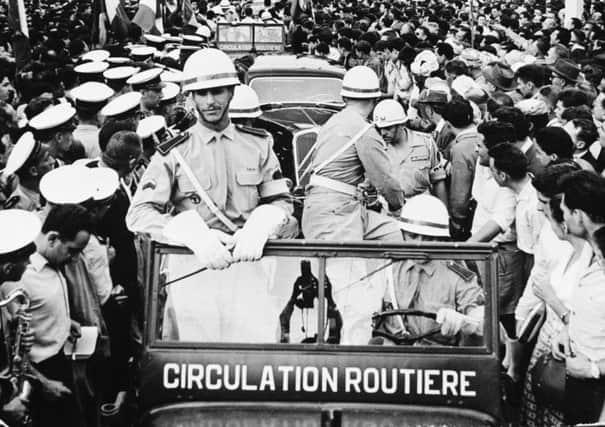Book review: Fight or Flight by Martin Thomas


FIGHT OR FLIGHT
Martin Thomas
Oxford University Press, 539pp, £25
I have an abiding aural memory of French car horns, broadcast repeatedly on the BBC news in 1960-1, when a student at Glasgow University. All over Paris, those horns pumped out a five-beat motto, three short blasts and two long, standing for Al-gér-ie Fran-çaise. De Gaulle was preparing to flee from Algeria after a long, bitter and exceptionally bloody fight and many of the French were expressing their displeasure in the most public way possible. There were also notable riots in the streets.
Somehow that rhythmic car horn chant symbolised the contrast between British and French decolonisation. The British, we thought, acted in a way that was smoother, less passionate, with minimal public involvement. It also occurred in a relatively bipartisan political atmosphere. The French was altogether more passionate and violent, producing no less than a political revolution. 600,000 pieds noirs, French Algerian colonists, returned to France, to an exile – as they saw it – with a bitter sense of abandonment. The only British equivalent, somewhat later, were the whites of Rhodesia who moved to South Africa, and those Kenyan settlers who packed up in 1963.
Advertisement
Hide AdDe Gaulle himself recognised the differences between the French and the British. The French, he noted in 1959, had attempted policies of assimilation, trying to convince their overseas subjects that they could become French, that politically and culturally they were bound together with metropolitan France. The British never attempted this, but acknowledged that other peoples were different in race and culture. “We were not very bright,” he suggested. All this seemed to be symbolised in the attempted post-Second World War political settlement of the French, their sense of the western Mediterranean as a French lake, and their organisation of massive federations in French West and French Equatorial Africa. Separated only by a narrow Channel, the British and French imperial experiences – and therefore modes of decolonisation – were essentially very different, not least because of the Vichy/Free French splits of the Second World War.
Martin Thomas sets out in this immensely impressive comparative study to test this hoary proposition. He examines the full range of acts of decolonisation, contrasting the ones where scuttle or flight were the order of the day – in the British case the best examples are the mad rush out of India in 1947, Burma in 1948, and of course Palestine in the same year – and those where the imperial power decided to dig in and fight. The French perhaps had more of the latter, in Indo-China, in Madagascar, and the traumatic 1950s Algerian War. The British set out to fight too – notably in Malaya and in Kenya. But such fights merely postponed the moment of flight, although the British preened themselves, excessively as always, on winning colonial campaigns and decolonising to successors whom they thought they could live with.
Thomas suggests that when decolonisation situations are examined in detail, the similarities are apparent, despite contrasting administrative ideas (which in some respects converged in the twentieth century) and political traditions. The revolts and their attempted suppression in Madagascar (the least known such events) and Kenya have some similarities despite different origins. In both cases, fight led to flight, and of course all the acts of decolonisation occurred in those two decades of strikingly tectonic geopolitical change between the 1940s and 1960s.
Perhaps for the French two instances stood out – Indo-China with the dramatic defeat at Dien-Bien Phu in 1954 and of course Algeria. In the British case, the violence of Partition in India was shockingly extreme. The Kashmir issue remains, even surfacing recently at cricket matches. The turbulence created in Burma and Palestine produced conflicts that have continued to this day. The aftermath of Mau Mau in Kenya still runs through the courts, the full extent of violence only fully revealed in later years.
Attempts at federations, a British passion no less than the French, failed, as in Central Africa, the West Indies, and Malaysia. There were, it is true, some smoother transitions, in Ceylon/Sri Lanka, in Malaysia, in some instances in the Pacific, and most notably in the Gold Coast/Ghana. Others of course led to civil wars, as in Nigeria and the Sudan, and various post-colonial horrors, with continuing French interventions in Africa. Perhaps the nearest equivalent to the Algerian pieds noirs were not whites at all, but actually the East African Asians, as well as other persecuted minorities elsewhere.
This is a remarkably brave and wide-ranging study, based on hugely impressive research. The arguments will no doubt continue and we do of course have to fit the Dutch, Belgian, Portuguese and, yes, American experiences into this comparative frame. Historians like to quibble and I cannot resist noting that there is little or nothing on the Pacific here and nothing at all on that remarkable phenomenon, the Anglo-French condominium in the New Hebrides, where the two nations, astonishingly co-operated in colonial rule, and the islands bear the marks to this day. We should also note that the so-called British Dominions also went through acts of decolonisation at this time, both of the old mandates and internally in respect of their indigenous peoples, in some respects not yet completed.